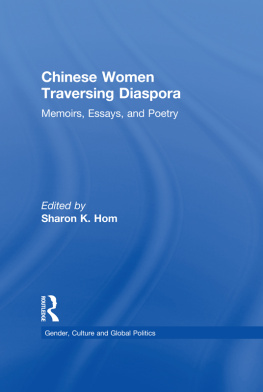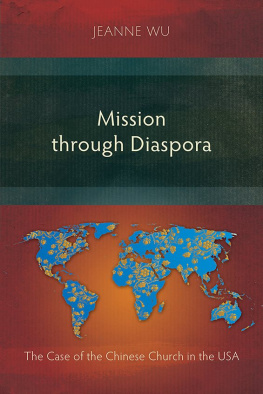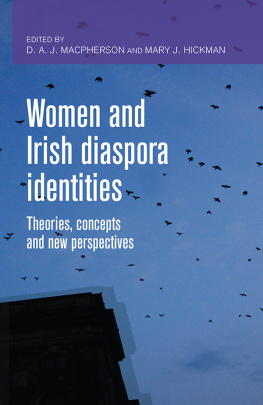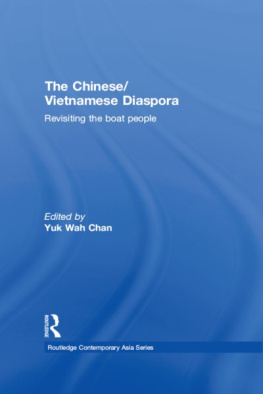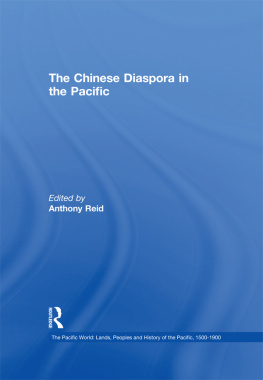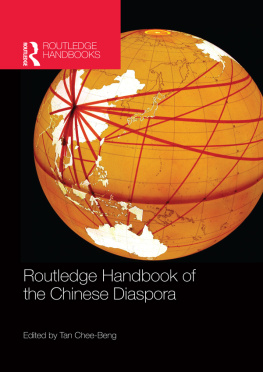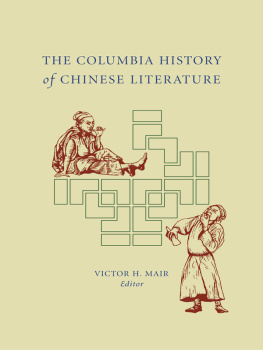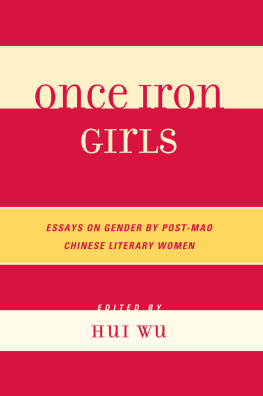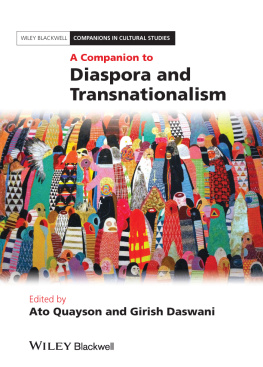C HINESE W OMEN T RAVERSING D IASPORA
G ENDER , C ULTURE, AND G LOBAL P OLITICS
C HANDRA T ALPADE M OHANTY , Series Editor
I NTERVENTIONS
Feminist Dialogues on Third World
Womens Literature and Film
edited by Bishnupriya Ghosh
and Brinda Bose
W OMENS M OVEMENTS AND P UBLIC P OLICY
IN E UROPE , L ATIN A MERICA ,
AND THE C ARIBBEAN
edited by Geertje Lycklama Nijeholt,
Virginia Vargas, and Saskia Wieringa
C HINESE W OMEN T RAVERSING D IASPORA
Memoirs, Essays, and Poetry
edited by Sharon K. Hom
First published by Garland Publishing, Inc.
This edition published 2012 by Routledge
Routledge
Taylor & Francis Group
711 Third Avenue
New York, NY 10017
Routledge
Taylor & Francis Group
2 Park Square, Milton Park
Abingdon, Oxon OX14 4RN
Copyright 1999 by Sharon K. Hom
All rights reserved
Library of Congress Cataloging-in-Publication Data
Chinese women traversing diaspora : memoirs, essays, and poetry / edited by Sharon K. Hom.
p. cm. (Gender, culture, and global politics : v. 3)
(Garland reference library of social science : v. 1076)
Includes bibliographical references.
ISBN 0-8153-2162-7 (alk. paper).
1. ChineseForeign countries. 2. Women immigrants. I. Hom, Sharon K. II. Series. III. Series: Garland reference library of social science ; v. 1076.
DS732.C558 1999
909.49510082dc21
98-39916
CIP
The United Nations Fourth International Conference on Women in Beijing (September 1995) prompts me to think about what feminists have achieved after more than four decades of organizing around issues of social and economic justice for women. I realize that civil rights are not the same as economic justice. While issues such as health, nutrition, reproductive rights, violence, misogyny, and womens poverty and labor struggles have achieved widespread global recognition, women still constitute the worlds poor and the majority of the worlds refugees. The so-called structural adjustment policies of the International Monetary Fund and the World Bank continue to have a devastating impact on Third World women. Militarization, environmental degradation, heterosexist state practices, religious fundamentalism, and the exploitation of poor womens labor by multinationals all pose profound challenges for feminists as we look toward the twenty-first century.
While feminists across the globe have been variously successful, we inherit a number of challenges our mothers and grandmothers faced. But there are also new challenges as we attempt to make sense of a world indelibly marked by the failure of postcolonial capitalist and communist nation-states to provide for the social, economic, spiritual, and psychic needs of the majority of the worlds population. At the end of the twentieth century, globalization has come to represent the interests of corporations and the free market rather than self-determination and freedom from political, cultural, and economic domination for all the worlds peoples.
These are some of the challenges addressed by the Garland series Gender, Culture, and Global Politics. It takes as its fundamental premises 1) the need for feminist engagement with global as well as local ideological, economic, and political processes, and 2) the urgency of transnational dialogue in building an ethical culture capable of withstanding and transforming the commodified and exploitative practices of global culture and economics. The series foregrounds the necessity of comparative feminist analysis, and scholarship and seeks to forge direct links between analysis, (self-) reflection, and organizing. Individual volumes in the series provide systematic and challenging interventions into the (still) largely Eurocentric and Western womens studies knowledge base, while simultaneously highlighting the work that can and needs to be done to envision and enact crosscultural, multiracial feminist solidarity.
Chinese Women Traversing Diaspora: Memoirs, Essays, and Poetry, the third volume in the series, is an elegant and creative text that embodies the above premises. It focuses on questions of identity, social location, voice, and the possibilities of feminist solidarity. This text not only complicates our understanding of diasporas, immigrants, refugees, and travelers, but also of the meanings of citizenship, of being U.S. American. Zhang Zhen says in her poem In America
In America all memories about wandering
Are thrown onto pile of car junks
Burning in the wasteland
Learn how to be a mute circle
Under the boundless clear sky
The writings in this collection cover a wide range of genres, from poetry, memoir, and critical essays, to a roundtable conversation on the Fourth World Conference in Beijing. What holds the writings together is the thoughtful, critical tone naming various migratory histories, and examining in great depth the fraught relationships all immigrants, travelers and settlers to the U.S.A. have to negotiatebetween communities of origin and communities of choice. One of the most important contributions of this text is in its mapping of questions of being and becoming for Chinese women. It is a rare collection, encapsulating in sharp, evocative terms, the diasporic journeys of Chinese women.
As Sharon Horn suggests in her introduction, this collection is a cartography of many points of arrival, and of a point of no return. What does it mean to be Chinese? What does it mean to be Chinese American? What does it mean to create alternative paradigms to read history and to dream about a future? What is the place of Chinese women in feminist and racialized communities and discourses, and in citizenship debates? What does it mean to be a part of the Chinese diaspora? How can we build communities of choice which foreground ethico-political agency? These are some of the questions taken up by law professors, journalists, womens studies scholars, literature and film studies professors, choreographers, dancers, tai-chi practitioners, and translators. The writings cross disciplinary, intellectual and spiritual lines.
Chinese Women Traversing Diaspora is a moving and inspiring testament to the radical possibilities embedded in leaving home. This book illustrates the spirit of comparative feminist praxis that this Garland series is committed to.
Chandra Talpade Mohanty
Ithaca, New York
In 1994, while I was attending the annual meeting of the National Women Studies Association, I had the good fortune to discover that I occupied the room next door to Chandra T. Mohanty. Like many other women at the conference, I had read and been inspired by her work, and so I introduced myself. Encouraged by her warmth and intellectual generosity, I mentioned a project on Chinese women that I had been incubating for some time. She later slipped a flyer for this Gender, Culture, and Global Politics series under my door. From that moment of feminist synchronicity, this collection of memoirs, essays, and poetry developed. For this gift of intellectual and political space created by Chandras vision for the series and faith in this project, I owe my deepest appreciation and thanks. To the contributors who were willing to explore this space with such imagination, honesty, and critical intelligence, I express much love and thanks for their patience, support, and friendship. I also want to thank Bob Lee and Eleanor Yung for access to the Asian American Arts Centre archives where I discovered the wonderful artwork of Mary Ting.



